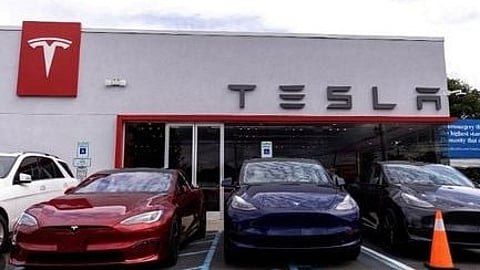

Elon Musk’s Tesla is facing significant challenges as its global sales and stock prices are tumbling. The company, which has long dominated the electric vehicle (EV) market, is now struggling to compete with Chinese automakers like BYD, which recently overtook Tesla as the world’s largest EV producer.
Adding to Tesla’s woes, Musk’s controversial political views and affiliations have alienated some consumers, further impacting sales and investor confidence.
In 2024, Tesla produced 1,774,442 electric vehicles, falling just 4,500 units short of BYD’s 1,777,965. The decline in Tesla’s sales is particularly evident in its two largest markets: the United States and China. According to S&P Global Mobility, new Tesla registrations in the U.S. fell by 11% in January 2025 compared to the previous year, even as competitors reported growth. In China, Tesla’s sales dropped by a staggering 51.47% month-on-month and 49.16% year-on-year in February 2025, according to the China Passenger Car Association (CPCA).
Europe has also seen a sharp decline in Tesla’s sales, with a 45% drop reported by Jato Dynamics. In Germany, Tesla registrations plummeted by 76% in February 2025 after Musk endorsed the far-right political party- AfD. Similar declines were observed in Norway, Denmark, Sweden and France. The company is also facing boycotts and protests in the United Kingdom and Portugal, further denting its reputation and sales.
Elon Musk’s political activities have become a significant point of concern for investors and consumers alike. A recent survey by Morgan Stanley revealed that 85% of respondents believe Musk’s controversial political views are negatively impacting Tesla’s business. Musk’s vocal support for former U.S. President Donald Trump and his involvement in Trump’s Department of Government Efficiency (DOGE) have drawn criticism, with some consumers opting to boycott Tesla vehicles altogether.
Tesla’s strategy of cutting prices to compete with cheaper Chinese EVs has also backfired. While price reductions have provided a short-term boost in sales, they have severely eroded the company’s profit margins, leading to investor unease. Add to it, Chinese EV makers continue to sell tech-heavy and feature-rich electric cars at prices far lower than Tesla. With a sharp focus on affordability, technology and styling, particularly in the electric vehicle (EV) space, Chinese companies have already disrupted the global car market.
Global brokerage firm JPMorgan recently lowered its forecast for Tesla’s first-quarter 2025 deliveries by 20%, from 444,000 to 355,000, and cut its price target for Tesla shares to USD 120 from USD 135. The brokerage cited protests at Tesla stores, sales boycotts, and a surge in second-hand Tesla vehicles as signs of growing consumer dissatisfaction.
Tesla’s stock price has mirrored its struggles. After soaring to a record high of USD 488 in mid-December 2024, Tesla shares have fallen by about 50%, hitting a low of USD 215 on March 10, 2025—the stock’s worst day since 2020. Although the shares saw a minor recovery later in the week after President Trump endorsed Tesla’s EVs during an event at the White House, investor sentiment remains fragile.
Amid these challenges, Tesla is preparing to enter the Indian market. The company has identified showroom locations and begun the homologation process for at least two of its electric cars. However, Tesla’s strategy of selling fully imported vehicles at premium prices—starting at around Rs 30 lakh—may limit its appeal in India’s price-sensitive market. While the Indian government is keen on attracting Tesla to establish local manufacturing, the company’s initial impact is expected to be modest.